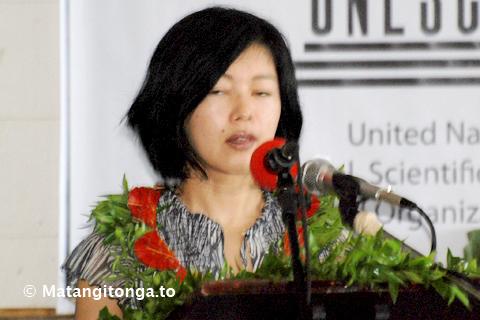Tonga's Minister of Education, Dr 'Ana Taufe'ulungaki, challenged participants at a World Heritage National Capacity Building Workshop, on 20 February to become responsible for the conservation of cultural and natural heritage.
"On some future date, we will be called to account for how we executed our responsibilities, and it is my prayer that our descendants will look back kindly on our accomplishments, and say, 'You did well!'", she said in her opening speech at the workshop held in Nuku'alofa.
The National Capacity Building Workshop is one of the activities that Tonga is required to carry out as it progresses toward ratifying the World Heritage Convention.
Mrs Lucy Moala-Mafi, of the UNESCO National Commission for Tonga, said that Tonga became a signatory to the World Heritage Convention in 2004, and since then Tonga had become eligible to some of their funding programs aimed at empowering countries to preserve tangible and intangible World Cultural Heritage.
The Convention for the protection of the World Cultural and Natural Heritage was adopted by the General Conference of UNESCO on November 16 1972 with the objective to protect, rehabilitate and safeguard our cultural and natural heritage.
As of November 2011, 188 states have ratified the World Heritage Convention, and 936 sites have been listed: 725 cultural and 183 natural and 28 mixed properties in 153 states.
Dr 'Ana Taufe'ulungaki said that a World Heritage Site "is still part of the legal territory of a State in which the site is located but UNESCO considers it in the interest of the international community to preserve each site."
For a state to list a site in the World Heritage list of sites, Lucy Moala-Mafi said that first a state must list the site in the Tentative List, then a year later it could proceed to be included in the UNESCO World Heritage List.
At the moment Tonga has two sites in the Tentative List, the Mala'ekula Royal Tomb and the Ha'amonga 'a Maui.
Dr 'Ana Taufe'ulungaki believed that it is worthy for Tonga to enlist Mu'a, the ancient capital of Tonga. She said that there had been a claim that Mu'a was a naval base for a Pan-Pacific Maritime Empire that existed for thousands of years. She said that the capital was later abandoned due to the rise of sea-level, "which rendered Mounu Wharf and the canals that were constructed to accommodate large transoceanic vessels inoperative . . ."
'Ana said that some sound research and archaeological evidence was needed to verify these claims, "because if there is substance to them we will have confirmation of a very advanced culture, capable of constructing sophisticated road and canal systems, and mammoth stone monuments, which made Tonga the capital of Polynesia."
Tonga already has World Heritage recognition. UNESCO on 7 November 2003 in Paris proclaimed the Lakalaka, Dances and Sung Speeches of Tonga to be a Masterpiece of the Oral and Intagible Heritage of Humanity.
According to UNESCO, cultural heritage does not end at monuments and collections of objects. It also includes traditions or living expressions inherited from our ancestors and passed on to our descendants, such as oral traditions, performing arts, social practices, rituals, festive events, knowledge and practices concerning nature and the universe or the knowledge and skills to produce traditional crafts.




